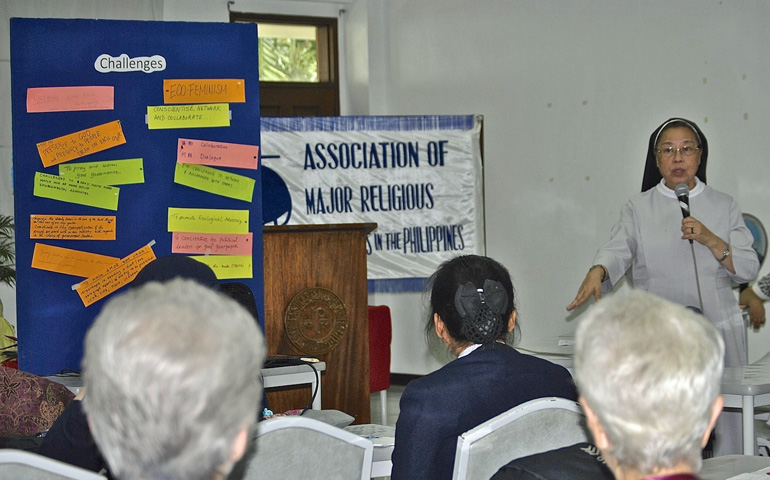
Benedictine Sr. Mary John Mananzan speaks at a workshop on challenges women religious face Nov. 15 at the AMOR XVI conference in Tagaytay City, Philippines. (N.J. Viehland)
Sixty-five religious women from Asia and Oceania concluded an eight-day conference with a commitment to deepening their spiritual bonds and strengthening cross-cultural and international cooperation to better serve the needy.
Held Nov. 10-17 at St. Scholastica's Center of Spirituality here, the AMOR XVI (Asia-Oceania Meeting of Religious) conference's theme, "The Mystic-Prophetic Dimension of Religious Life," led the women to combine their spiritual and prophetic ideals.
By the time they spent a week together in this town two hours south of Manila, they agreed to strengthen their collaborative efforts and to network more freely with governments, nongovernmental organizations, civil society and members of other religions.
During the gathering, the women religious from 11 countries repeatedly cited common pressing social issues, including rampant government corruption, human trafficking, violence against women and children, and climate change. Lay and religious resource people who also attended the conference gave presentations on those topics and others.
"Our executive committee designed the program and in various input, sharing sessions and discussion groups, critical 'burning issues' in Asia and Oceania were given focus," Benedictine Sr. Mary John Mananzan told NCR. She said she hopes the steps AMOR is taking to cooperate more fully will attract more conference participants.
Conference participants visited local homes, parish communities, service communities and an ecological farm to deepen their understanding of the role of religious life in the Philippines.
Sri Lankan Sr. Bernadette De Silva of the Holy Family of Bordeaux community in Sorsogon, southeast of Manila, said she was most interested in the discussion on abuse of women and children because she sees it a lot in Rizal, where her community is based.
"My other concern is poverty, how people are struggling to live day to day," De Silva said. She noted that though the issue was not taken up separately at the conference, "everything else discussed is connected to it."
Sr. Hoang Xuan of the Lovers of the Cross of Vinh in northern Vietnam described her first AMOR conference as a "good opportunity for me to hear how religious congregations are involved in social work and how they reach out in social issues." These are situations she has not seen in Vietnam, she said.
She said listening to group discussions show her that "not only the Philippines, [but] in Thailand and Japan, [women religious] really get involved in social issues and social justice, and that's what I want in the future -- that we can do something like that."
In the session "The Cost of Telling Truth," Rodolfo Lozada Jr., a former official for a government-owned corporation, shared his experience as a whistle-blower against former Philippines President Gloria Arroyo's government and how the women's Association of Major Religious Superiors in the Philippines raised funds to provide his family sanctuary and support.
In the final AMOR conference statement, the women tied together their spiritual and social goals, stating: "A mystic is a prophet in contemplation; a prophet is a mystic in action. It is the very essence of our religious life. ... We are challenged to deepen our contemplative life like mystics and allow our prayers to sharpen our senses to the global realities and, like prophets, reach out to the people of God."
The women said they also plan "to revision the goals of AMOR to rekindle the fire of its original spirit and passion and to urge the women religious to come together as one in service to God's people." AMOR dates back to the early 1970s, and its women religious leaders and members gather usually every four years to share ideas and support and encourage each other. More than 100 nuns from 18 countries attended the last conference in Bangkok in 2009.
This year's statement noted that the gathering took place at the end of the super Typhoon Haiyan (locally known as Typhoon Yolanda), which brought "much pain, suffering and death" to the people of the Philippines, including islands where participating sisters had communities.
Japanese Sr. Luca Maria Ritsuko Oka of the Franciscan Sisters of Militia Immaculatae, a homegrown congregation, said she appreciates the growing networking of the women. "It's very important for a domestic congregation to go beyond the boundary, the frontier."
The Nagasaki-based nun, who served on the conference's executive committee, told NCR she tries to reach out to groups outside her country because "if you close yourself in your own congregation or country, you close yourself to the grace of God. ... You can't be close to the people, and you can't be close to God."
For Filipina Social Service Sr. Marinela Narvaez, sharing in the AMOR gathering deepened awareness of social issues. "The issues are really nothing very new, like corruption in the Philippines, but I gained another perspective sharing with sisters from other countries," Narvaez told NCR.
She cited a comment of a sister from Singapore about a priest jailed there for misusing church funds. Meanwhile, in the Philippines, she said, "no official accused of corruption has been sent to jail." However, sisters from Thailand, Vietnam and Taiwan found the Philippines sisters more prepared to combat corruption than those in their countries.
"They observed that we have the structure, whereas they feel powerless in their countries to fight corruption," Narvaez said.
Cardinal Luis Antonio Tagle of Manila opened the gathering with a Mass on Nov. 11.
"A mystic is someone who sees but also someone who hears, and someone who touches, specially the deepest realities that really matter in life," Tagle said.
"We abide in someone by looking, by seeing, by hearing, by allowing someone or a reality to touch, by touching the other," he said.
They must also stay in touch with the poor, Tagle told the sisters, adding, "This is what we call mysticism -- to listen to the word of God constantly being spoken to us as we abide in the poor and the suffering," through whose life stories the Holy Spirit inspires prophets.
Today's prophets, he said, seek "to deepen our awareness of and commitment to social issues, especially those affecting the environment, women and children in Asia and Oceania."
The final AMOR statement cited Tagle's homily reminder about the "need to abide in the Lord and offer hospitality to each other and abide with each other."
[N.J. Viehland is NCR's correspondent in Asia.]




